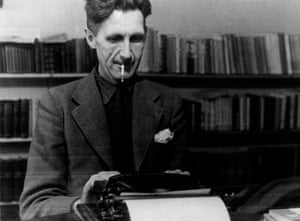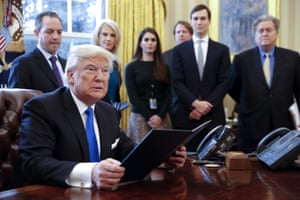Reading George Orwell’s Nineteen Eighty-Four again, now, hurts. And I’m not the only one to be revisiting it: sales of the book have soared in the past week. What you had previously thought you read at a cool, intellectual distance (a great book about “over there”, somewhere in the past or future) now feels intimate, bitter and shocking. Orwell is writing of now when he writes, “Every year fewer and fewer words, and the range of consciousness always a little smaller.”
Of course, we all have to keep our heads (especially we have to keep our heads). The lies about the crowd size at Donald Trump’s inauguration by the hapless White House spokesman Sean Spicer at his first briefing were not earth-shattering. But any lie from this podium is deeply unsettling. Any hopes that Trump or his team were, underneath it all, “normal” rightwingers, have dissipated.
The post-truth era certainly shares aspects of the dystopian world of Orwell’s Nineteen Eighty-Four. Michael Gove’s infamous comment that Britain has had enough of experts is just one step away from 2+2 = 5. In the interrogation scene in 1984 this is the most appalling moment: before now we read it as a ludicrous indictment of the rejection of reality (surely, we conclude, the party itself must know that 2+2 = 4; science, machines all depend on it). In Nineteen Eighty-Four, the elite, personified by O’Brien, foster and control this willingness to believe one thing one day, and one thing another. Now, it seems, the party itself may believe the lie. As Orwell writes: “Science, in the old sense, had almost ceased to exist. In Newspeak there is no word for science.”
Then there is privacy – Orwell puts the diary and the private self at the heart of his writing. In 1984, keeping a diary is Winston’s first act of transgression. Orwell knew that authoritarian regimes want the heart and soul of people. His two-way telescreens predict social media. And we have, perhaps unwittingly, wandered into a world where feelings have never been more easily swayed: Trump summons them up personally and directly. In the book, Winston is suddenly struck that his mother’s death, “had been tragic and sorrowful in a way that was no longer possible … She had sacrificed herself to a conception of loyalty that was private and unalterable.” It could no longer happen because “there were fear, hatred and pain but no dignity of emotion, no deep or complex sorrows”.
But this new world has been a while coming. Trump adviser Kellyanne Conway’s “alternative facts” were foreshadowed by the George W Bush adviser who said in 2002 that the new American empire was “creating [its] own reality”. As in the 1930s, war has been at the heart of the corrosion of trust in politicians. The lies over Iraq and the quagmire of Afghanistan were followed by the financial crash of 2008, and bankers’ bonuses – making people far more willing to disbelieve the remote metropolitan media and be drawn to the false dawn promised by Trump.
Yet these are the obvious big lies. There has been a long drift away from rational beliefs that we have watched too passively. Mistrust in facts was sown by the insistence on creationism and climate change denial by politicians and in many US churches. But it’s not just America – in India, government officials say that cows don’t contribute to global warming because they breathe out oxygen. Even universities with their “no platforms” have added yeast to the brew.
Trump is not O’Brien. He is more like a cut-price version of Big Brother himself. Instead of the elite of Nineteen Eighty-Four, who keep Big Brother’s identity a mystery while they keep total control, this Big Brother, with his direct Twitter relationship with his followers, is fully on show. And as Orwell foresaw, his slogan could be “Ignorance is strength
Tim Crook: Trump takes doublethink to a new extreme
Trump’s first few days of office have been such an explosion of propagandist grapeshot, it’s little wonder many people have been reaching for copies of Nineteen Eighty-Four. His seminal essay Politics and the English Languageshould also go on the emergency reading list.
Orwell said political language can be “designed to make lies sound truthful and murder respectable, and to give an appearance of solidity to pure wind”. Washington Post media columnist Margaret Sullivan wrote that this week’s reference by Trump spokesperson Kellyanne Conway to “alternative facts” means we have “come full Orwell”. But have we?
Orwell certainly would have appreciated how the eruption of populist demagoguery and the Brexit and Trump triumphs have generated a “post-truth” anxiety in the mainstream media. Journalism’s key institutions sense a crisis. Public sphere news and current affairs interpretation is supposed to represent reality to the audience. Orwell said that “realism” used to be called dishonesty, and wrote in his account of the Spanish civil war, Homage to Catalonia, that bombs are impartial because they killed the man they were thrown at, and the man who threw them.
Orwell never set foot in America. But he was an avid critic of its literature and politics, and would have conceded that his attitude to the USA had elements of the very doublethink he dramatised in Nineteen Eighty-Four. While he resented how post-second world war US economic dominance frustrated the realisation of the British socialist dream, he chose the American side against the Soviet Union in the cold war.
After his death, his crystal-pane deconstruction of the corruption of revolution and the totalitarian game were adopted as propagandist weapons by the CIA against the Soviet Union. The early transfer of Animal Farm and Nineteen Eighty-Four to film was even financed by the CIA with the endings changed.
But Trump takes doublethink to a new extreme, and if Orwell were alive today, I imagine Trump would amuse and horrify him at the same time. The key message in Nineteen Eighty-Four is that the purpose of propaganda is to narrow and limit human consciousness, confuse human conscience, and control and narrow the range of thinking. As all students of Orwellian literature will recall, Squealer, the propagandist porker in Animal Farm, can “turn black into white” and is expert in “new belief”.
If any Orwellian unmasking of Trump rhetoric begins to hurt him, I imagine the day will come when the president gestures with his characteristic shape-and-pinch hand movement and bellows, “Fake Orwell”.
DJ Taylor: The parallels are impossible to deny
It is just possible to feel a shred of sympathy with Kellyanne Conway. Stung by incontrovertible evidence that more people were keener on complaining about her boss than supporting him, took refuge in a form of words that would have been hilarious were they not at the same time horribly sinister. But it would be wrong to judge her too harshly for her defence of Sean Spicer’s “alternative facts”. She is a PR, operating in a world where all values are expedient.
It’s useless to pretend that this isn’t all sharply reminiscent of the world of Nineteen Eighty-Four (by coincidence, Orwell died 67 years ago to the day that the anti-Trumpites marched on Washington). Winston Smith, sitting in his cubby-hole at the Ministry of Truth falsifying back-numbers of the Times in accordance with the latest revisionist diktats from on high, deals in “alternative facts”, or rather with deliberate untruths that eventually become facts merely because the former versions of them are no longer around to disturb.
The same goes for the periodic “readjustments” (ie reductions) of the amount of rationed goods available to the cowed citizenry of Orwell’s Oceania. There, the impact of cuts can always be reduced by altering the words of the previous announcement.
Inevitably, much of this manipulation can be traced back to Orwell’s monitoring of the concealments and evasions of the second world war – the Katyn massacre, for example, when thousands of Poles were murdered by Soviet secret police and which some Russian history books omit altogether – but its roots lie in his experience of fighting against Franco in the Spanish civil war. It was here, he later wrote, that he first read newspaper accounts of battles that had not taken place and heard reports of soldiers charged with cowardice whom he knew had fought bravely.
None of which should obscure the fact that this defender of objective truth was also a propagandist (working for the BBC’s Eastern Service in the early 1940s, Orwell once complained that the fault of the government’s war-time propaganda was that it needed to do its job more effectively.) At the same time, he was confident that there were lines which neither right nor left in western democracies would cross. The Daily Telegraph, for instance, features near the top of a list he once compiled of newspapers which were reliable. He might not have agreed with the way it interpreted the news, but he believed the information it contained was accurate.
As for what Orwell might have thought of President Trump and his entourage, he would probably have drawn attention to the steady war of attrition fought by various political and corporate oligarchies over the past 50 years against the idea that it can be said that a particular event definitely happened, whether you approve of it or not. He might have pointed out, too, that these obfuscations are not merely a byproduct of total war – who could really complain about the RAF rigging the numbers of Nazi planes brought down in the Battle of Britain? – but part and parcel of the way in which a certain kind of contemporary autocrat and reality-twister faces up to the world.
Meanwhile, it is worth asking what the average person is supposed to do in a landscape where the leader of what used to be called the free world has such a wanton disregard for one of the principal tools of freedom. Even Big Brother, after all, brought a certain amount of guile to pretending what he said was true.



No comments:
Post a Comment